She is both a delicate flower and a dragonfly. Her willowy, slender frame masks the fighter within. Her magazine-cover beauty — the high cheekbones, full lips and inviting eyes — are a nod to her Hollywood genes. The cropped hair — wavy and bleached — reveals her spirit and confidence, well-earned by navigating a complicated odyssey.
Within an hour of meeting Camille Conrad and her best friend, Kelly Giebel, they are throwing trivia grenades. The one that pulled the pin: The deadliest creatures on the planet are not apex predators such as lions, tigers and sharks.
It’s the dragonfly. Nature’s sicario has a kill rate of 95%. Confident, lethal, efficient.
“Probably why it’s the most popular tramp stamp,” Camille says with a deadpan delivery.
This conversation is happening in California’s dusty Central Valley, at a racetrack outside Bakersfield. Inside the grounds of Buttonwillow Raceway, a small circus is setting up shop. Pop-up tents with Pirelli logos; dually trucks belching diesel while pulling tricked-out trailers full of expensive super bikes. RVs with kids zipping around on mini-motos and scooters. Racing teams with big money welcoming friends and onlookers into cinder-block garages that resemble mini airplane hangars.
Camille, meanwhile, is rolling low-key, setting up shop on a shaded patch of dirt. She and Kelly are staying 10 minutes down I-5 at a budget motel. Her Toyota Tacoma rests next to a small trailer that contains just her motorcycle and supplies for the weekend. It’s parked adjacent to her friend and mentor, Jimi Mac. Jimi owns 40 bikes. His trailer has a bed. Jimi’s mustache and his gait might as well be his business card: He’s a fire captain in Reno. He’s also an experienced racer and will be counseling Camille through her first super bike race.
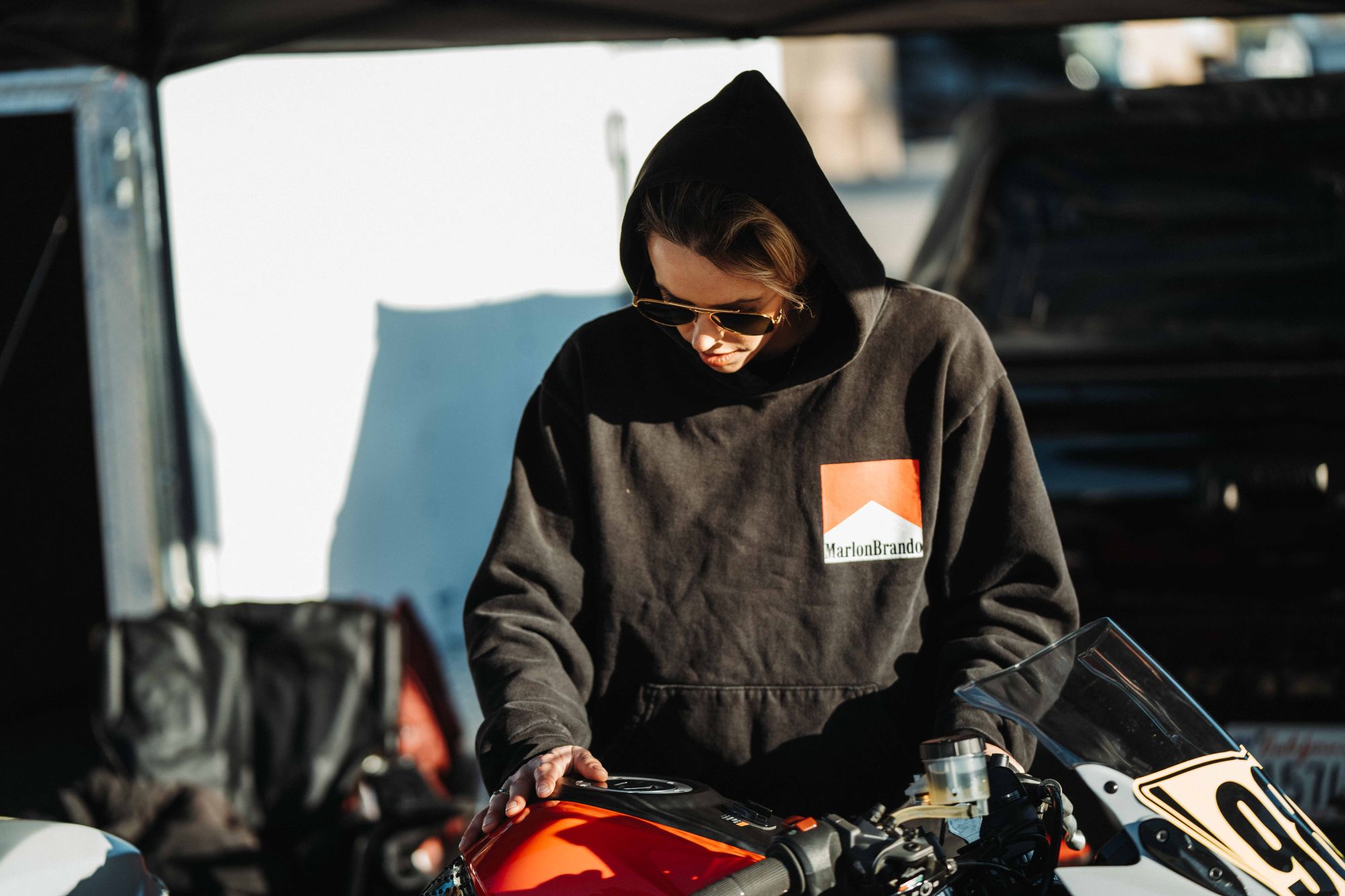
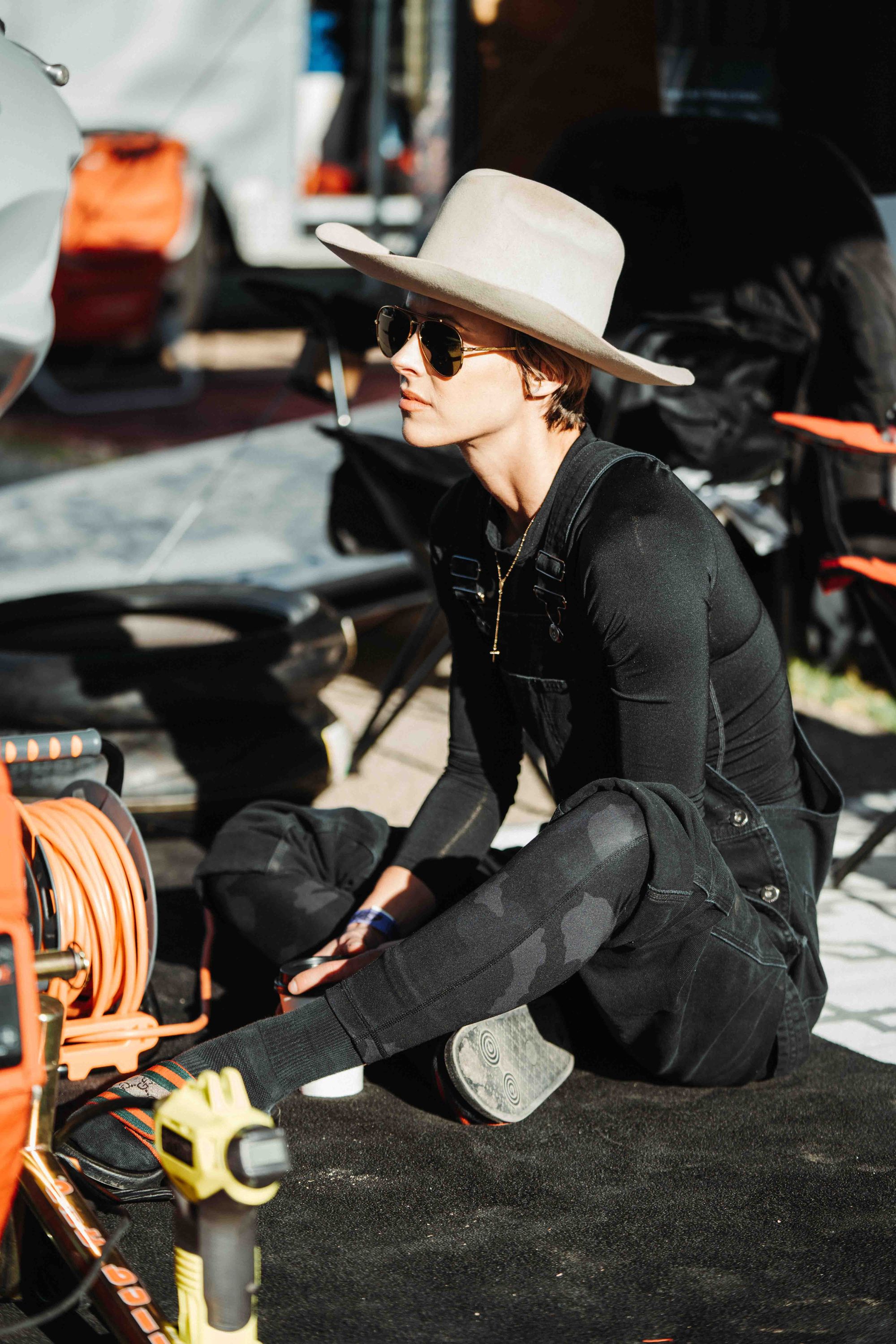
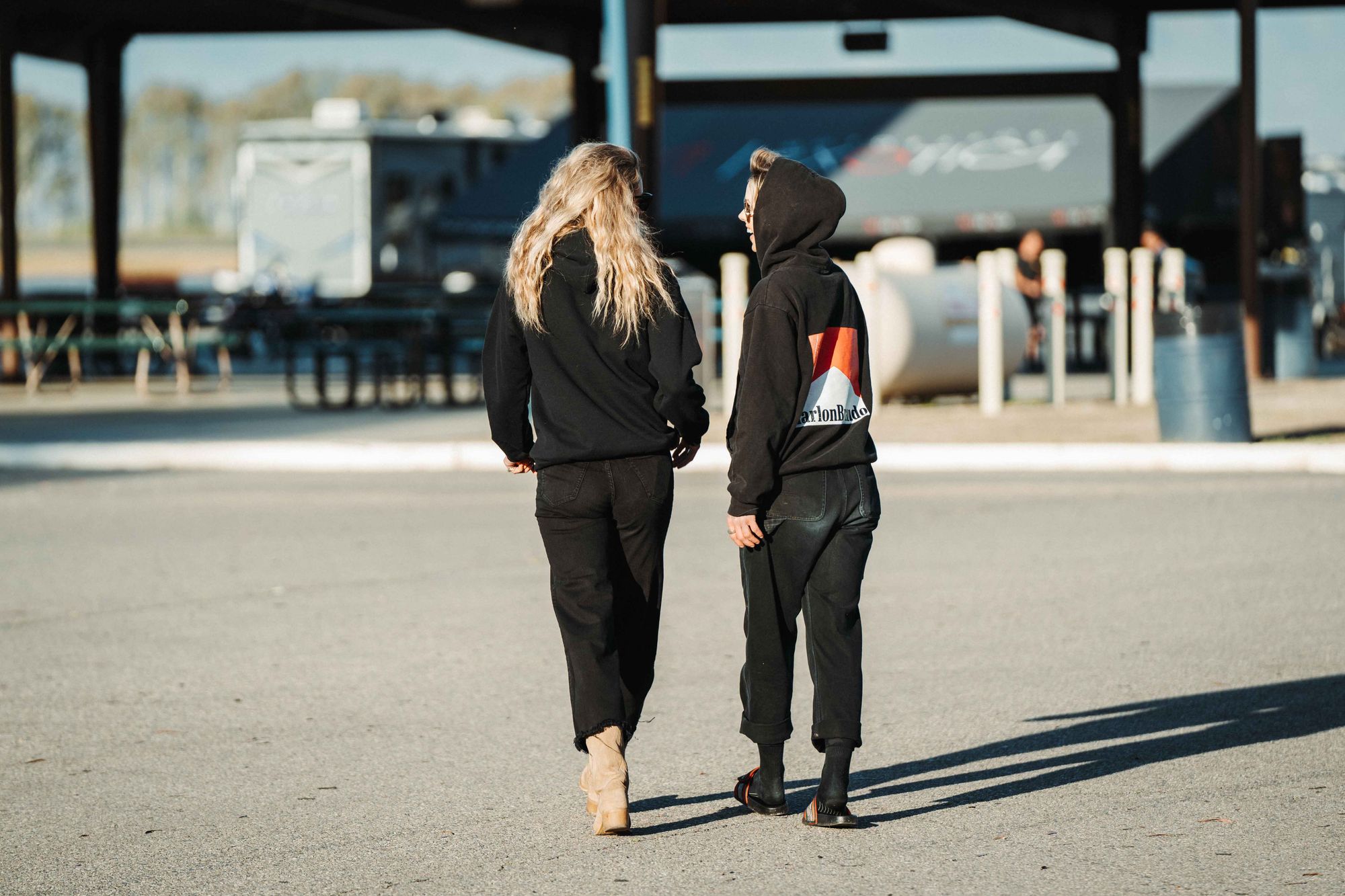
Camille Conrad at Buttonwillow Raceway outside Bakersfield. Her friend, Kelly Giebel, is also pictured. [Matthew Fults photos]
Following an inspection, Camille is pushing her 370-pound Yamaha back to its temporary pit. She’s wearing aviators and a black hoodie that says ‘Marlon Brando’ on the left chest, over her heart. In her 37 years, Camille has followed her heart many times. That’s the delicate flower persona and has led her on many adventures that have shaped her.
And then there’s the dragonfly. Camille is tough. She’s strong. She’s the protector and the predator. In that way, the Brando hoodie fits. She is like Johnny Strabler, his character from the 1953 classic recognized as the original biker outlaw movie.
It was called “The Wild One.”
Robert Conrad’s career as a Hollywood television and film star was beginning to wane when he settled his second family in Bear Valley, California. The star of television series such as “The Wild Wild West” and “Baa Baa Black Sheep,” Robert Conrad often played the tough guy.
After five kids with his first wife, the two divorced in 1977 following 25 years of marriage. Later that same year, Robert Conrad met an Alabama beauty queen named LaVelda Fann. The two fell in love and had three daughters: Kaja, Camille and Chelsea.
Bear Valley is a rural, mountain community west of Yosemite National Park. Robert Conrad was attracted to its reclusiveness and rugged terrain. It would serve as inspiration for future productions and roles, such as “High Mountain Rangers” and “Search and Rescue.”
“As adventure is concerned, it was kind of a paradise in a lot of ways,” Camille says. “Bear Valley is a town of 150 people. It snows an average of 300 inches annually. And we were given a lot of autonomy, very young. We grew up driving snowmobiles. We would take ourselves from the house to school. My dad would come out and start a 1985 Yamaha Phazer and send Chelsea and I to school. And our playground was the national forest.
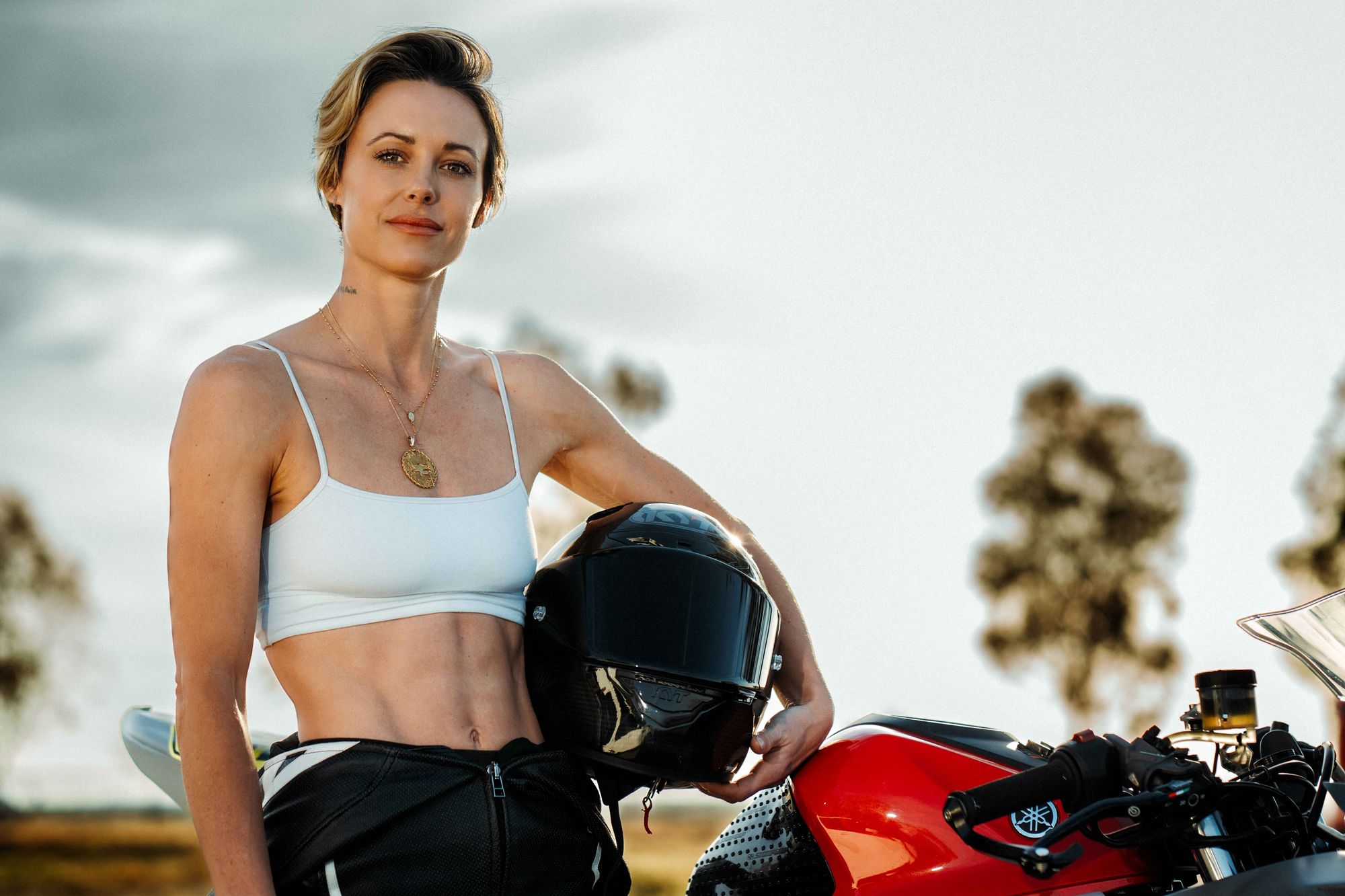
“And I think that gave us a strong sense of independence from a young age. Being so close to the natural elements gave me a reverence that I might not have had otherwise.”
While her five half-siblings grew up under the Hollywood lights, Camille and her sisters didn't experience much of that life. Yet, as she grew older, Camille was able to glimpse her father’s fleeting fame and gain an understanding of the star he once was.
“A lot of my father's career happened prior to me being born, so I noticed it on trips when we would go to Los Angeles,” Camille says. “And it was always something that didn't really fit for me. You know, it was kind of a crazy dichotomy from being like ‘Uncle Bob in Bear Valley’ and then there were times where we would be at drive-thru, for instance, and people would be hysterical, and I'm kind of like, ‘What is going on?’”
Her younger sister Chelsea only began to comprehend her father’s “first life” by watching reruns.
“We didn’t have cable, so it wasn’t until I started watching some reruns that it really registered. He was more like a local guy. He was coaching my soccer teams. It didn’t feel glamorous,” Chelsea says.
As Chelsea got older, she started meeting people from his entertainment past. “And that’s when I started to realize that he had this whole other life where you’re this pretty impressive guy. I didn’t know any of that growing up.”
Fame certainly wasn’t something Camille understood. Or sought. Her simple life in the backcountry was her personal nirvana. She was the most athletic of her sisters. So much came naturally to her that she rarely needed to work hard to succeed.
This is how skiing became an important chapter in her story.
“Bear Valley and skiing are kind of synonymous. As part of our elementary school curriculum, we skied two days a week, and then, I naturally joined the ski team. So from the time that I was probably in the third grade, I was skiing four days a week and I started competing and I had qualified for the Junior Olympics in ’99, which actually ended up being my last competition.”
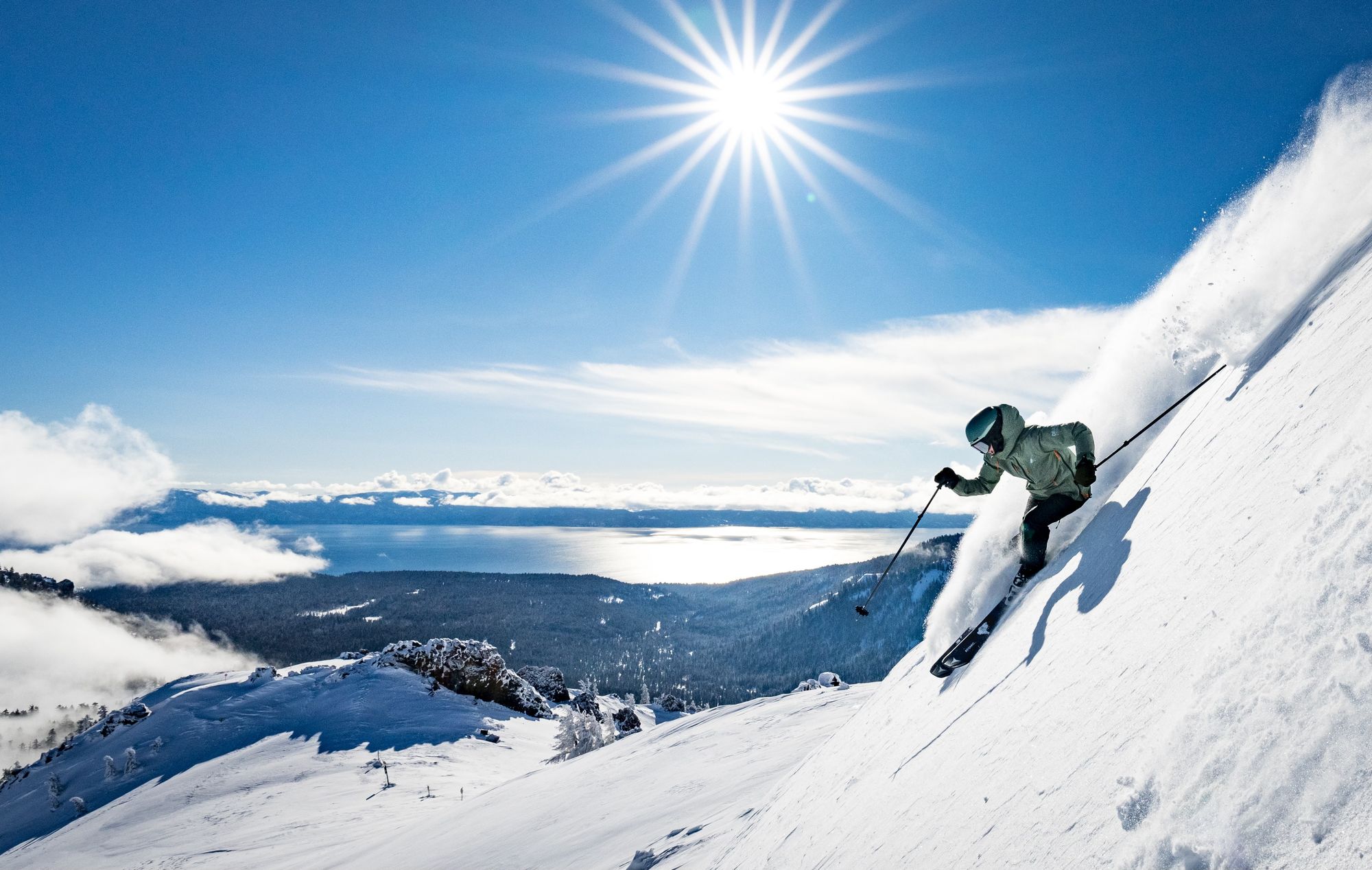

Camille Conrad has always felt most at home on the mountain. [Jeff Engerberston photos]
That year — 1999 — Camille was competing against future Olympic medalist Julia Mancuso and future Olympian Stacey Cook. This was a whole new world of skiing. She dominated the Bear Valley side of the Sierra, placing on the podium in nearly every race. But as she moved up the ranks, reality began to take hold.
“I was a contender. I hadn't really developed yet. So I was pretty small and I got worked. I had been kind of a big fish in a small pond in the central series of the Far West Division. I kind of thought that I was hot stuff. And then when I competed on a national scale, I had a reality check.
“I didn’t know how to handle that.”
This became a pivotal point in her athletic journey. Bear Valley didn’t have a high school, which meant she would need to join Sugar Bowl Academy, near Lake Tahoe, if she wanted to pursue racing. The other option was attending a “normal” school in Angels Camp.
“Up until that point, it had been a two-room schoolhouse taught by a married couple, Jim and Trish Federly. I'd never heard a school bell ring, I'd never changed classes, I'd never been to a dance. And so those things were really appealing to me. After getting schooled (in skiing), my mindset was just kind of off.
“I equated that with my worth and I didn't necessarily understand how to put work into something I had been naturally … you know, skiing came naturally to me as a lot of athletics did. And I felt like at that time, having to work at it meant that I wasn't that good, which I understand is backwards.”
Camille chose to quit ski racing. It was a decision she admits regretting, but also one that would later offer a chance at redemption. In between those pivotal moments, things got a little messy.
Sometime around Camille’s 17th year, her home life had become problematic. Her father’s on-camera persona was also his off-camera persona, and her mother was developing mental health issues while simultaneously battling addiction. Both parents would drift in and out of being present in their children’s lives.
“My father was renowned as being a tough guy. And that was something that he was very proud of. And I would say that his fathering style didn't differ from his public persona. He was a tough man.”
In a span of 13 months, two accidents and an attempted suicide would rock the Conrad family. Robert was involved in a drunken driving accident, where he was found at fault. Then Chelsea, whom Camille vowed to protect, would be in a coma after the car she was a passenger in went over a cliff, dropping some 350 feet. And their mother attempted suicide, not long after Chelsea’s accident, Camille says.
Camille felt the burden of Chelsea’s accident because her younger sister had wanted to attend a party with Camille that night. Camille said no, and fate dealt Chelsea a brutal hand. Chelsea was in the middle seat, without a seatbelt. She broke her back, had internal bleeding, broken ribs and damage to her brain. She was on life support to help her breathe. Her recovery was measured over months.
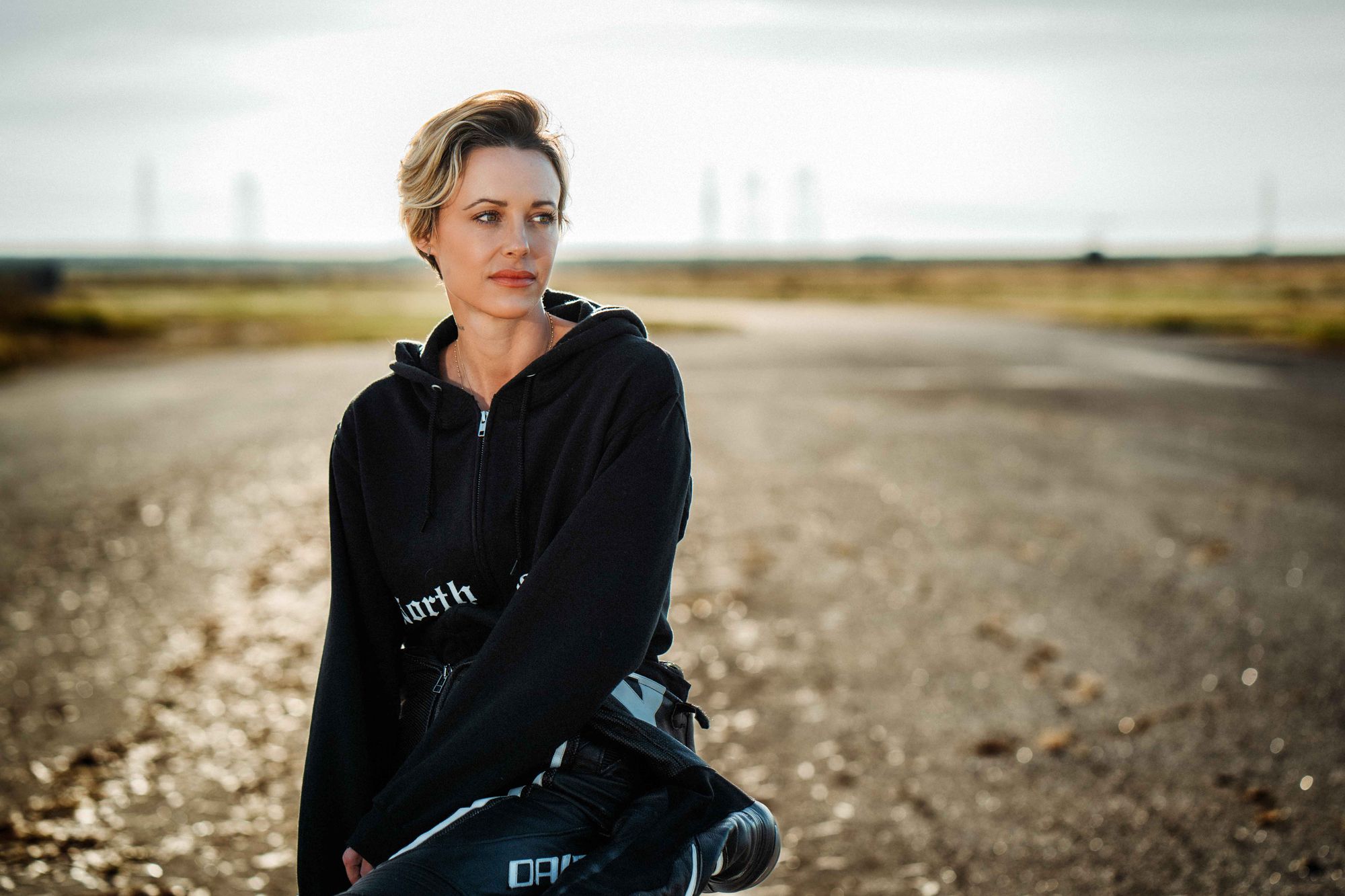
“You never think it’s going to happen to you. And I don’t think I was ever able to really process how hard that was for her,” Chelsea says. “My parents were self-destructing. They loved us a lot but they weren’t great parents.”
Robert Conrad would find himself in a spinal cord rehabilitation facility in San Jose. He was no longer able to live in the mountains. Chelsea was entering her junior year and Camille had just graduated. With older sister Kaja in college, Camille was given a car and a credit card and told to fend for herself.
“I think that was a direct result of mom and dad kind of checking out and being very focused on themselves, not really aware of what that meant for us as formative humans,” Chelsea says.
This 13-month trauma-filled time capsule wasn’t a one-time thing. There was a steady drip of anguish that followed the family’s timeline.
Camille adds, “And my parents, I don't think, had the capacity at that time to kind of see beyond what they were struggling with. And so I think they were able to provide or show their love for me monetarily. And it was kind of like, ‘Here, take this girl.’ And those were challenging circumstances to grow from.”
This collection of experiences vaulted Camille into what she calls her renegade years. After high school, she left Bear Valley to try community college. She quickly discovered that wasn’t her thing. She wandered a bit and wound up in Los Angeles. This was part of an exercise she now sees as a way to pacify her father.
“I partied a lot. I didn’t know what my direction was or how to achieve it. I was always searching,” Camille says. “I told my dad I wanted to act, but it was just a lot of private jets and backstage passes. The social lifestyle was my world and it was not fulfilling.
“I took some acting classes and I found it to be really revealing and difficult. I struggled with confidence back then, and so having a camera expose my insecurity was very painful.
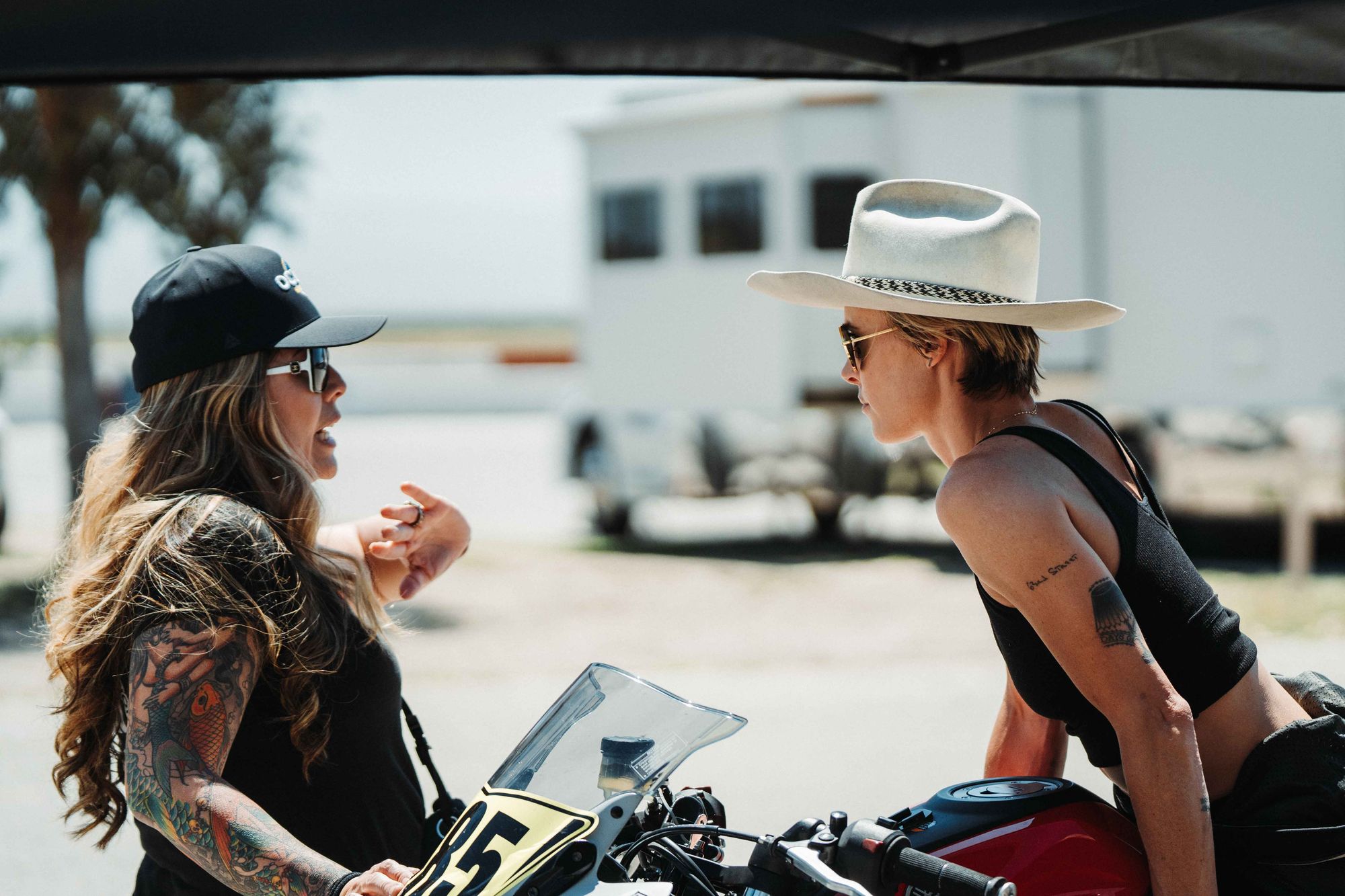
“And then, I found myself behaving in a way that I would have disliked. When I first moved there, I became what I despised in a way.”
Camille recognized in her mid-20s she had an unhealthy relationship with alcohol. This experience — trying to get sober — was the moment she began to heal herself.
“It was very clear early on that I have difficulty governing myself at times. And yeah, I think I'm an alcoholic through and through. I tried everything to moderate my drinking and it was really defeating to find myself in the same position as people who I had abhorred at one time, because of my parents’ substance abuse. I had suffered so much.”
After two stints in rehab, Camille came through the portal with renewed faith in herself and an optimistic future.
“I think that was really the beginning of my healing journey. I never stood a chance if I was going to continue to drink.”
Camille has been sober 11 years.
Camille’s journey as an athlete and person is filled with full-circle moments. When she left L.A., she needed to steady the ship. As it happened, her mom saw the same thing and reached back into the family past to see if she could help her middle daughter.
“I think it's another way for me to kind of emphasize that there was love and care in my house. You know, my mom had seen me kind of chasing my tail a lot, and she reached out to Paula DuPrè Pesme (a producer on the “Harry Potter” films and “Mrs. Doubtfire” among countless others), who was a longtime family friend. She actually met my dad on a chairlift and she became a nanny for us when I had first been born.
“And then she went to work for my father's production company and then ended up having a very substantial career of her own. And she had established a nonprofit in Boulder and was doing documentary filmmaking. And her nonprofit there provides fundamental services to families with children facing a critical illness. And so she and my mom were kind of in cahoots to get me on the straight and narrow.
“So I thought Paula was offering me a job. And she was. But that was influenced by my mom, which I'm very grateful for because that was also another integral step in kind of righting my direction. And what that did for me was I had to be accountable for the first time. I was in the habit of cutting and running.
“Paula really showed me what it meant, what unconditional love meant. I was stocking warehouse shelves and I was grocery shopping for families. And I couldn't disregard the work that I was doing because it was important.
“And I think that all of those components really helped fortify me again. Having to be somewhere every day, not being able to leave Paula, and her being so gracious with and generous with her spirit. I think, it really helped not like tame me, but let me know that I didn't have to fight so hard.”
In all of my conversations with Camille, there are two things happening at once: She is reconciling her past while searching for her future. In the Conrad household, there were extremes. The children felt love, but they also felt emotional and physical pain. Camille references the two often as if she’s asking the gods to explain the dichotomy.
I asked Chelsea to share an anecdote that sums up Camille. She took her time, looking off into the distance, smiling and mumbling to herself about which one to choose.
And then she turned to me and said, “This isn’t a funny story. It’s a sad story.”
Tears welled in her eyes, and her voice began to crack at the memory of what she’s about to reveal.
“But it’s indicative of her character.”
Chelsea shared a story from her junior year. Her friend group typically stayed late after school, and around 4:30 p.m. it was time to go. Chelsea had previously told her mom they needed to drive some friends home.
“So she shows up late, she shows up drunk and there was someone in the passenger seat. There were four kids, and it’s a five-seater car. And I’m like, ‘Okay, I’m a kid’ and I don’t want to call my mom out for being drunk because there’s this weird power structure.”
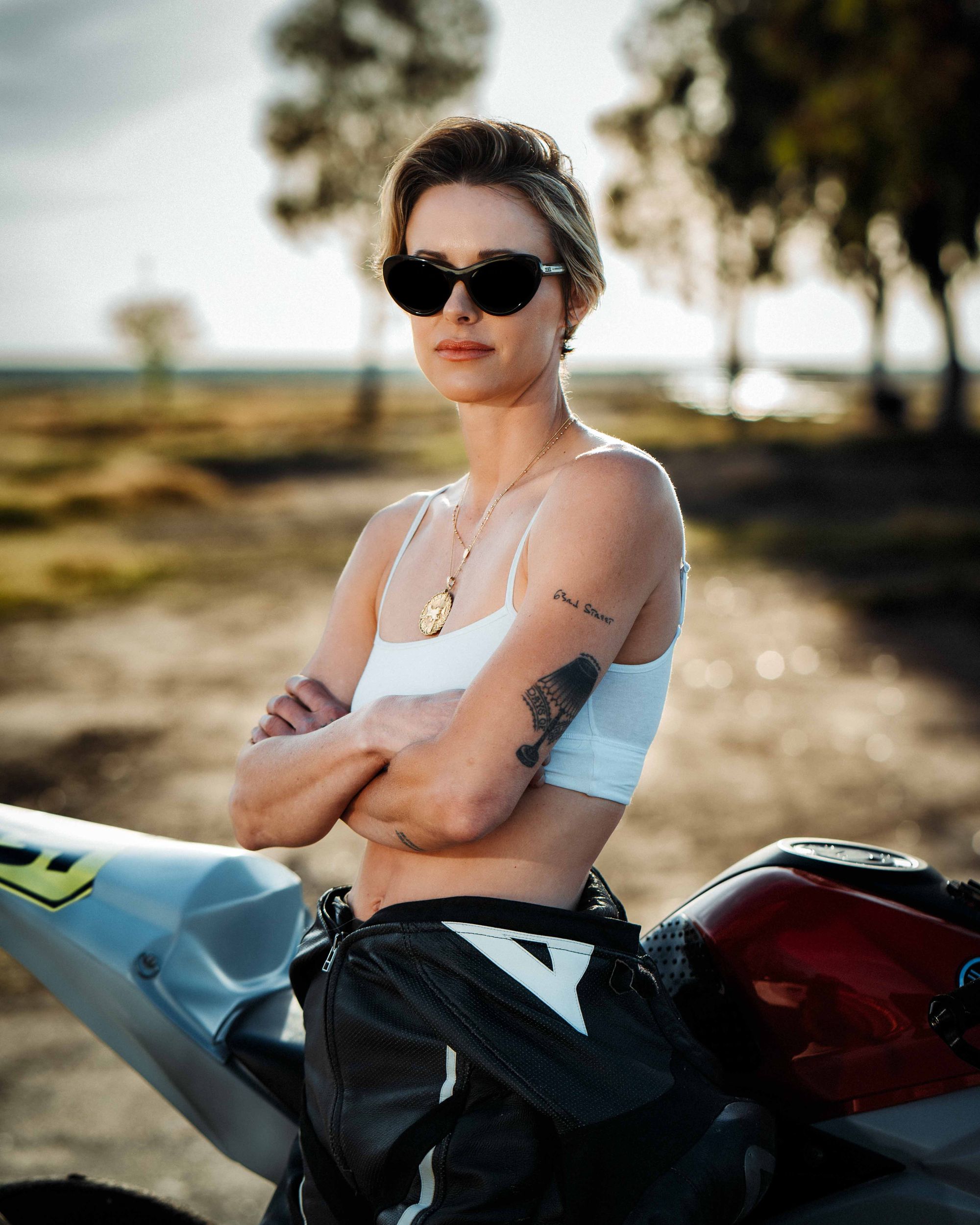
Chelsea says she looked at the woman in the passenger seat, non-verbally pleading for her to drive. But it didn’t register. So the kids pile into the car, and her mom is driving down this winding road and Chelsea started getting nervous. She’s already been in a life-threatening accident that left her in a coma with a traumatic brain injury among other serious ailments.
She remembers getting really scared and asking her mom to pull over. Her mom turns around and starts mocking her previous brain injury, taunting her with lines like “What are you going to do?” That pushed Chelsea’s panic into overdrive.
“So we make it, and we make it home alive, and I told Camille.”
Chelsea took a long pause here, bracing for the gathering tsunami of emotion. Through a wall of tears, she continued.
“And then Camille went down and she got in my mom’s face and said ‘What the f--- are you doing?’ And my mom beat the shit out of her. And Camille just took it. She looked her right in the face. There was a moment where I was like — my mom is not a big lady — was she gonna knock her out right now? She never hit her back. It was really gnarly.
“It’s a pretty tell-tale sign of her character.”
In that moment, the dragonfly emerged. She was the protector and the predator. She withheld the fighter within, yet still confronted her mother to protect her sister. By standing up for Chelsea, challenging her mother, and taking a beating, she provided a non-violent response to her mother’s irresponsible behavior. In effect, she was the apex predator by punishing her mother through strength and will. Her love for Chelsea allowed her to be the strongest person in the room.
After that incident, LaVelda Conrad left for a time. And as Chelsea says, “We had a safe space for a while.”
“I was driving to work one day. I had just turned 30 and I had been watching a lot of videos of Michelle Parker ski. And she's also a woman who I competed with when I was younger as well. And I would see her ski these lines and there was just something inside of me that just wanted to do that so badly,” Camille says.
She’s still in Boulder, Colorado, at this point. Her proximity to the mountains, and living in a winter climate again, accelerated her desire to reconnect with that part of her life.
“I had this realization that if I didn't pursue it now or soon, I was going to continue to get older and I was going to continue to be bitter. And this pain that I was harboring would never be alleviated. And that just really impacted me on that drive for whatever reason that day. And I was like, ‘I got to move back to the snow.’
“And so I did. I quit my job and a random invitation to raft the Grand Canyon yielded a move to Truckee.”
Camille quickly dove into the skiing scene in Truckee. It’s a magical place, just north of Lake Tahoe on the California side. Multiple world-class skiing mountains are at your fingertips. A couple of hours to the west was Bear Valley. But Truckee was now — and has remained — home for her.
By immersing herself again, she knew two things: the first was she didn’t want to be a ski racer. The second was, she still needed that competitive fix. But maybe even more than that, she may have been seeking closure. And as things often do with Camille, an opportunity presented itself.
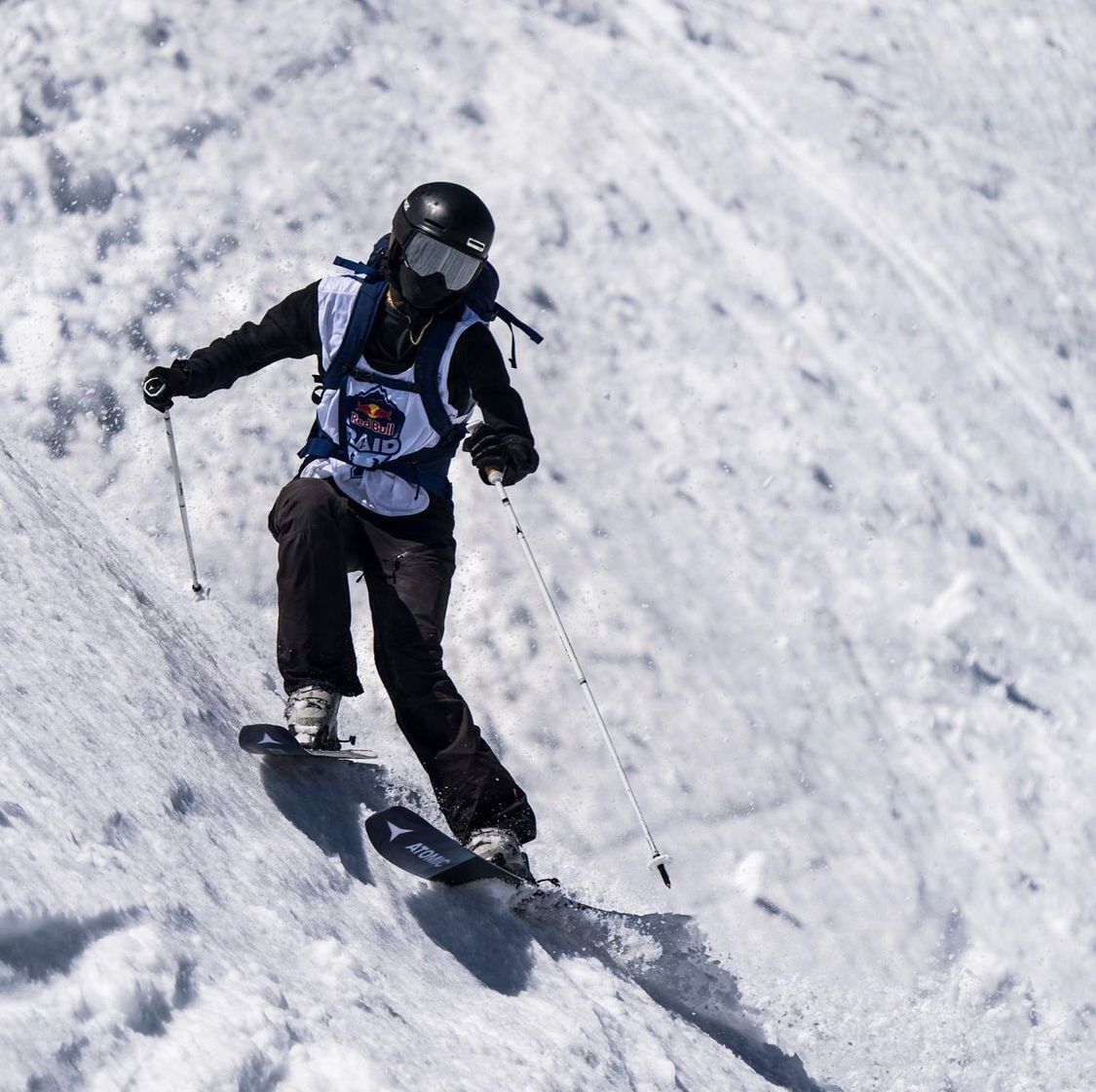
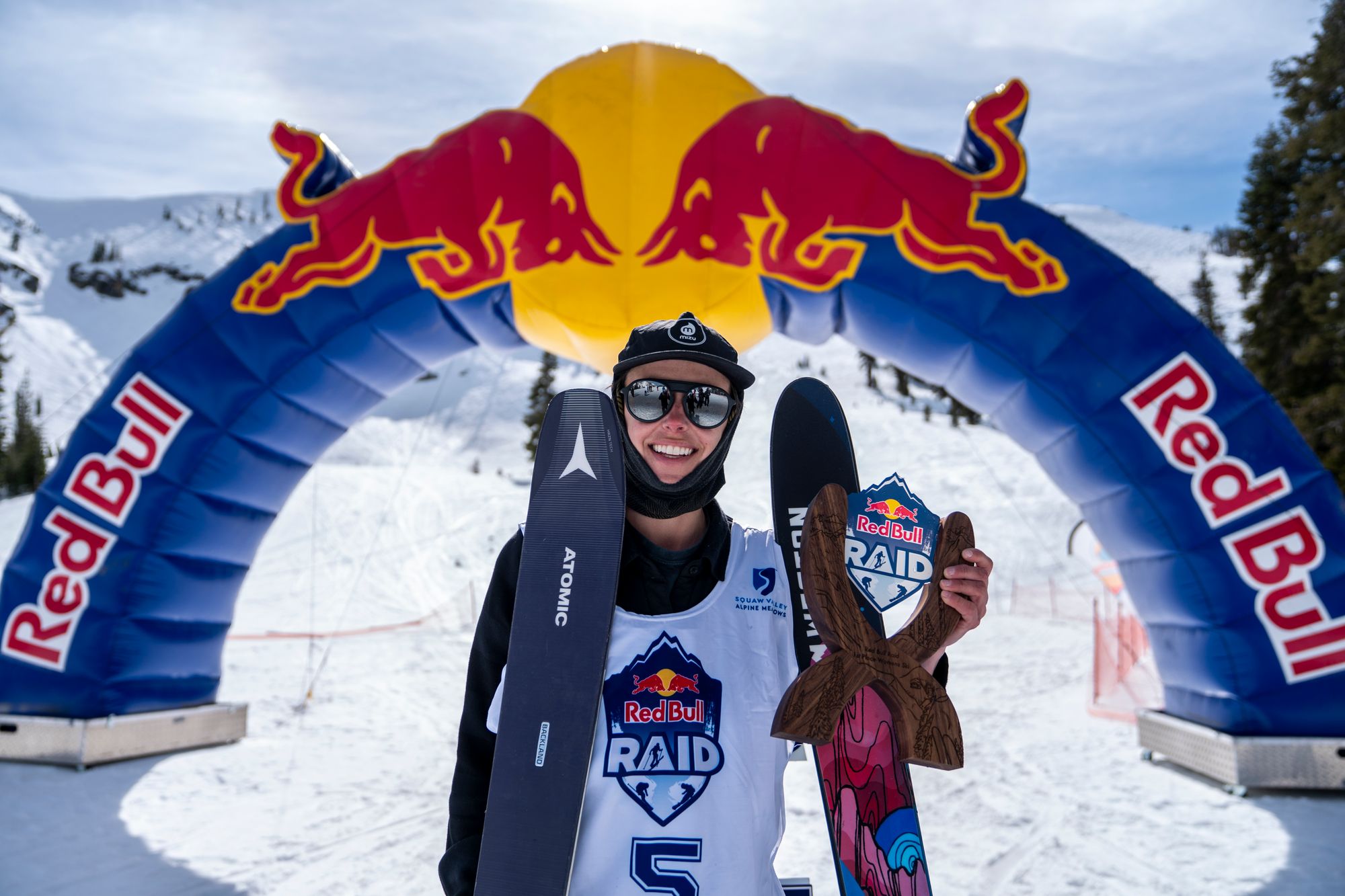
When she decided to return to ski competition, she went all-in. Here, winning the Red Bull Raid. [Courtesy Camille Conrad]
“It was, again, through happenstance that somebody suggested I compete in this event. It was a Red Bull event called the Red Bull Raid. And essentially it's a race skinning (essentially skiing uphill, with boots, skis and poles) on the way up. And then you're judged on your line down. I was last on the way up, but first on the way down and I won that competition.
“And it was the first time that I had competed since the Junior Olympics. And that was a really fulfilling moment for me.”
Winning the Red Bull Raid allowed her to reach into her past and close a chapter. She never felt good about walking away from ski racing. She left a part of her on the podiums, on the chairlifts and in the finish areas. Skiing was an identity wholly hers. Not her Hollywood father’s. Not her beauty queen mother’s.
Did winning that event satisfy her desire to reconnect the past with the present?
“I kind of feel like I did. It came and went quicker than I would have thought it would have. But I think by virtue of just deciding to go and do it and the time that I had in the mountains … that was very gratifying and very fulfilling to me.”
The search for the competitive skier in Camille was complete. She connected the cosmos and found solace. But there was also Camille the kid. The adventurer in the national forest. The climber of trees with her sister. The one who used every fiber of strength she and Chelsea had to yank-start that Yamaha Phazer snowmobile and race down the road at high speeds, laughing like they were getting away with something.
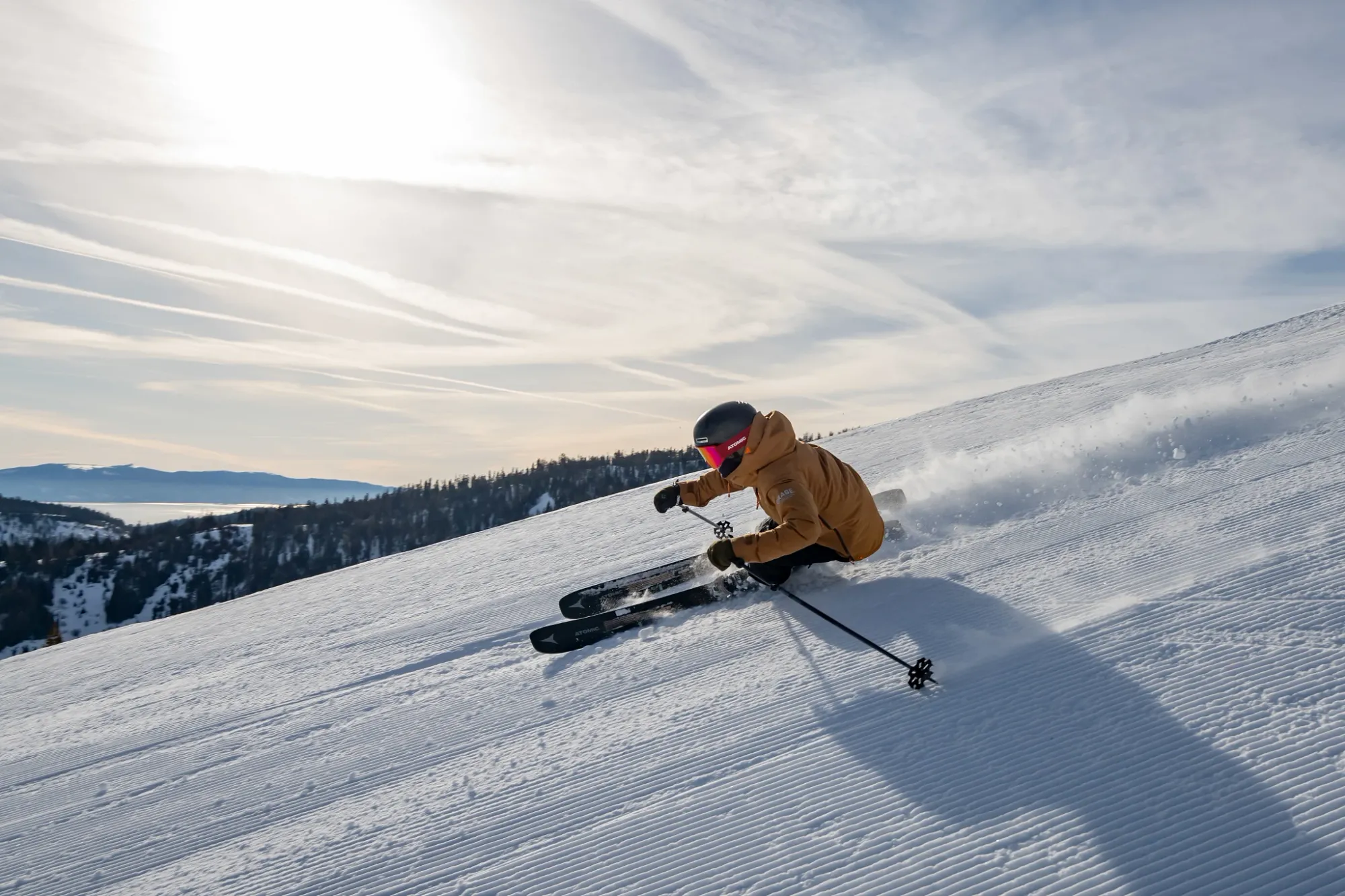
She wanted to reconnect with her teenage self, too. And she found that connection in the unlikeliest of places.
“I ended up coaching athletes that were a similar age to I was when I departed the sport, and that kind of put me in touch again with that younger part of myself. And just being on the snow with them all the time really brought me a lot of fulfillment,” Camille says.
Today, she is still skiing big lines, teaching and coaching, and has turned her influence on the mountain into ambassadorships with brands like Atomic Skis, Zeal Optics and Flylow apparel. The team she is coaching, fittingly, is known as The Rippers.
Back at Buttonwillow Raceway, Camille and Kelly are passing the time between practice runs talking to each other in fake accents. Sometimes it’s Southern Belle, sometimes it’s British. They have an easy rapport, and the depth of their friendship is clear.
Kelly is 38, taller than Camille and blond with piercing blue eyes. She’s also into motorcycles and skiing, and random handstands anywhere. The two met, of all places, on a chairlift about six years ago.
“I knew I had to be her friend and I had no idea why,” Kelly says. “At the time, I didn't know what I felt. But now I know that it's because I hadn't met someone — a female friend — that gave 150% in everything she decided to do, which I resonate with because I do the same.
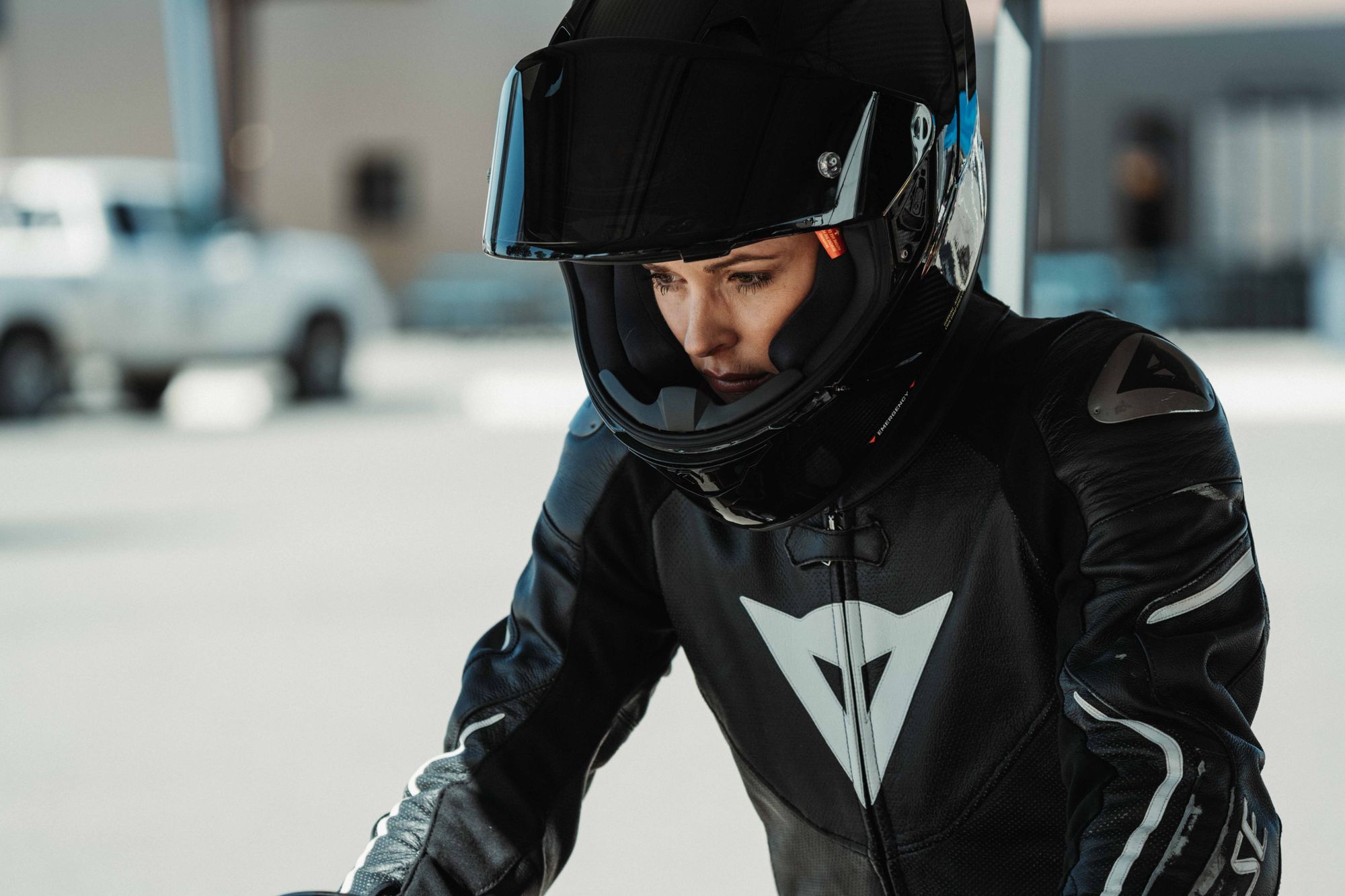
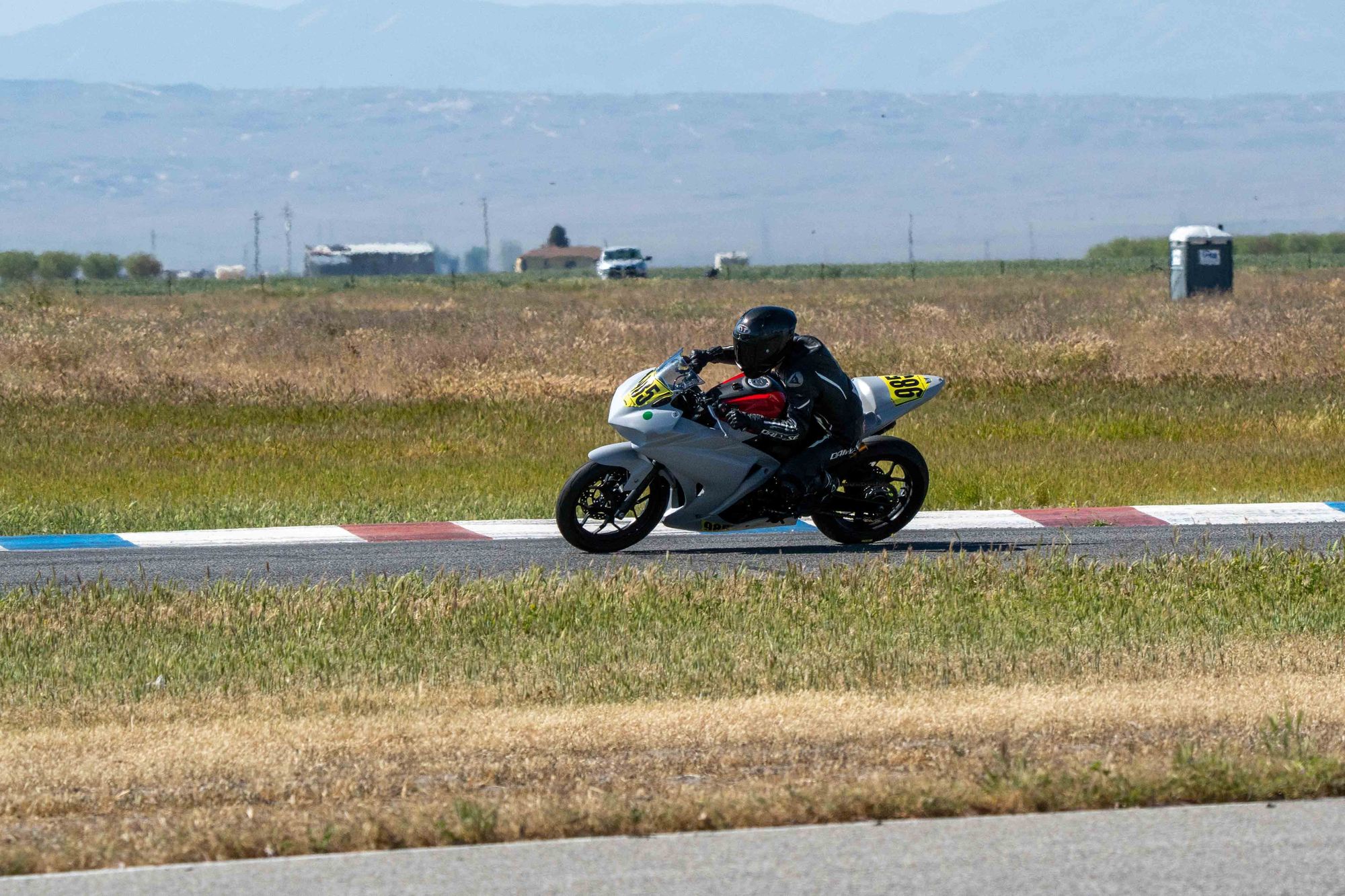
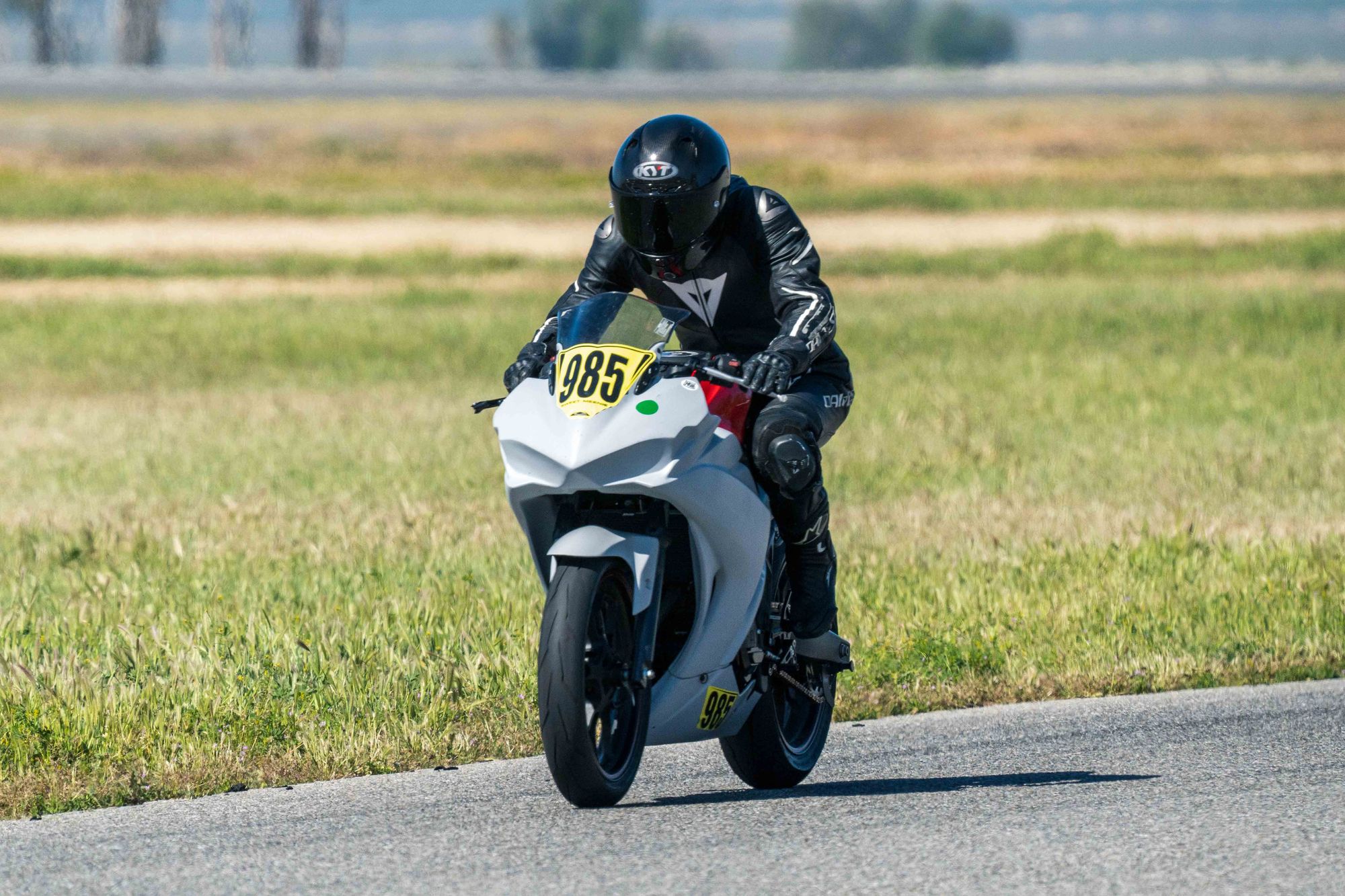
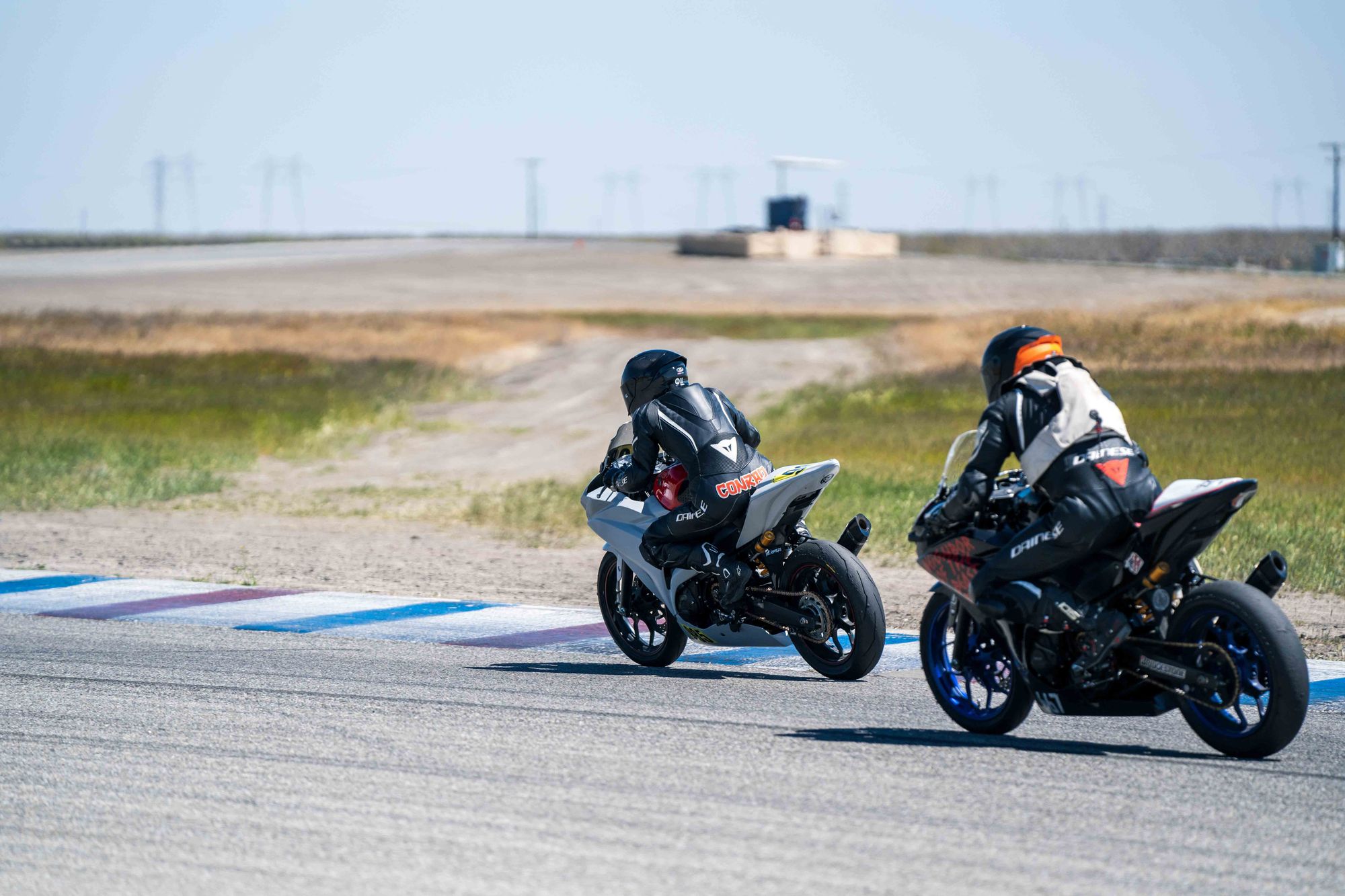
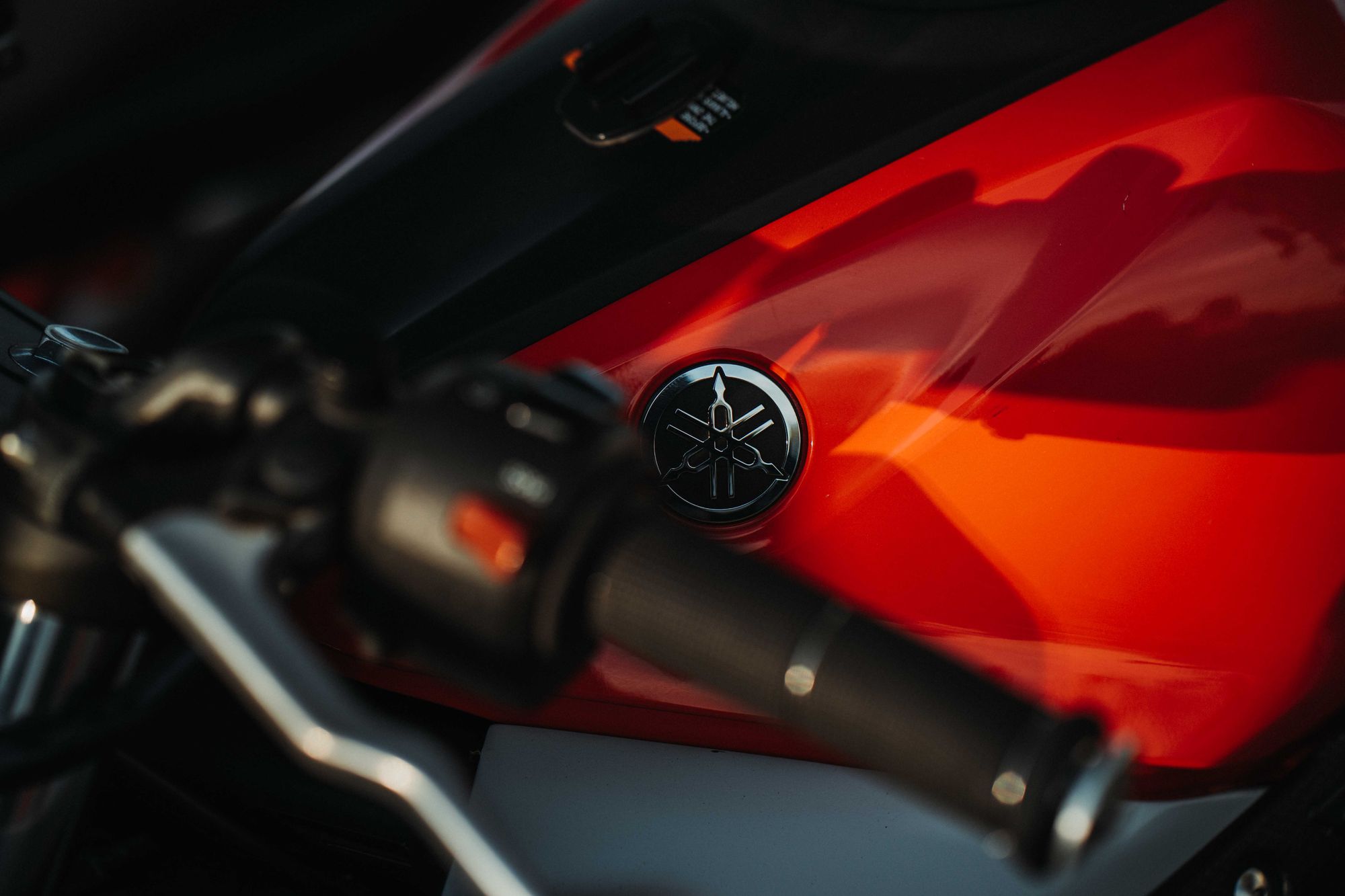
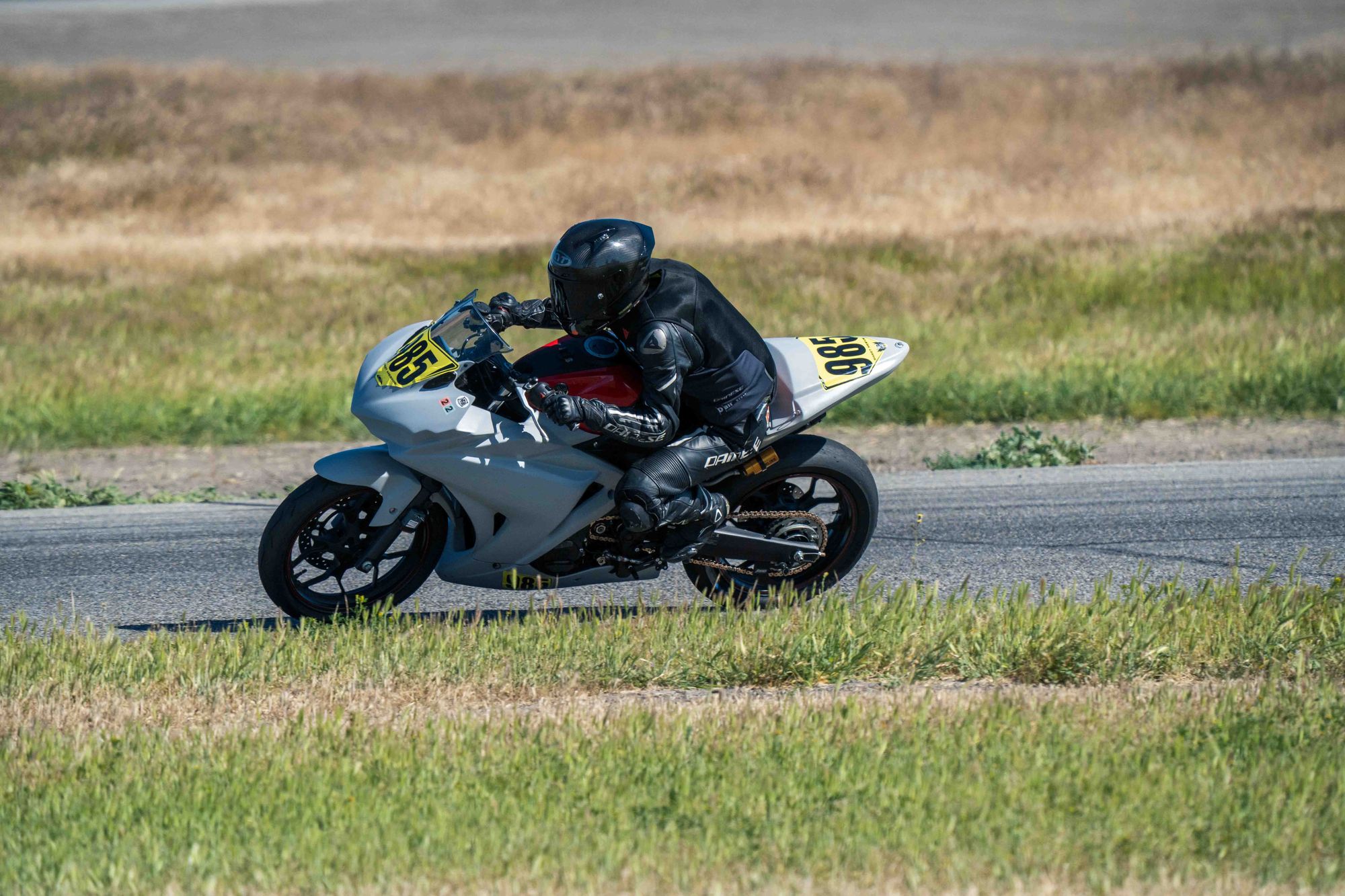
Race day proved rewarding. [Matthew Fults photos]
“She'll give it all to you in one breath and take it all the way in the next.
“I think skiing — extreme sports — it's a very intimate relationship with yourself. And I think that it also helps you feel safe and trust yourself. And so I think it comes all back to love, searching for love in a safe place. And you can do that through extreme things,” Kelly says.
In her 20s, Camille dated two different guys who had Ducatis. If you don’t know motorcycles, Ducatis are handmade in Italy and the ultimate crotch rocket. There was one moment in particular that set her hair on fire and launched her obsession with moto. And of course, it has a Hollywood connection.
“Roberto Santos (actor, producer, writer) came to pick me up on his red Ducati. And I remember hearing it when he was pulling up my street. And I was like, ‘Could it be? Is this happening?’ And I remember being so nervous, getting on the back of his bike, and he took me to sushi downtown. And then it was night and we got on the 10 and he opened it up and I was holding on to the back of him and I could see the speedometer and we were going upwards of 100.
“And I remember looking down at the pavement and acknowledging how consequential what we were doing was. And it enlivened me. It was such a sensational feeling to be so close to something so high-consequence.”
The weekend is both a culmination and a progression. Camille is at Buttonwillow to compete in her first super bike race. She arrived at this moment after a series of fleeting attempts to fully embrace her lust for moto.
“I had always had an affinity for bikes, but they were very intimidating to me. I didn't know the first thing about them. I didn't know what CCs were or anything. So the prospect of learning how to ride one felt out of reach.”
She eventually attended a rider school and received her ticket to ride. She was smitten.
“I found myself daydreaming about motorcycles. And so I found one. It was a Ducati 1098 S. It was black. Its name was ‘War Machine’ and I had that bike for four years, didn't know what I was doing on it,” she says, laughing at the memory of owning a bike she had no business riding. “But ignorance is bliss sometimes.”
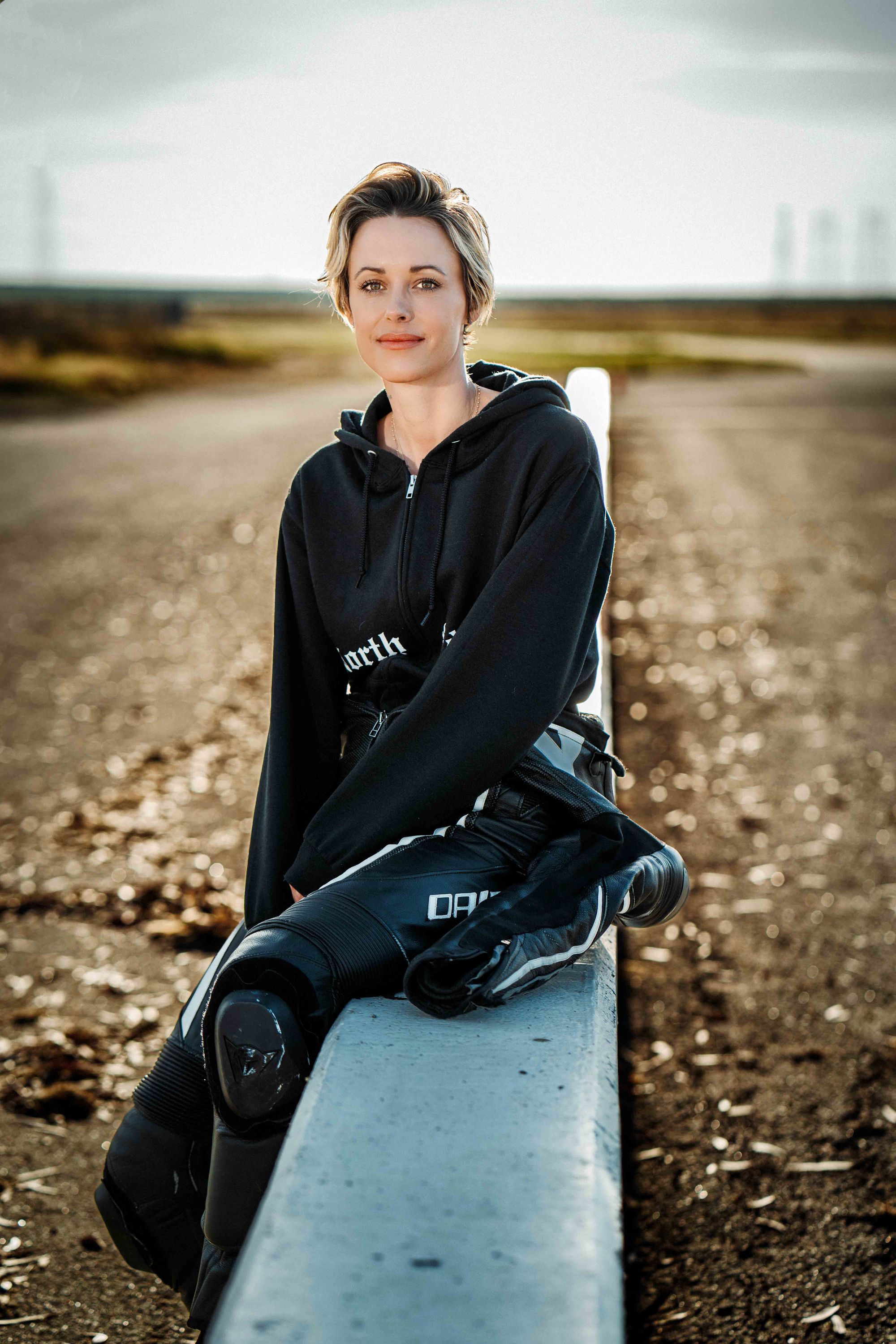
Camille had this dance with motorcycles for a few years. It was more of a “Should I? Should I not?” question. After meeting Kelly, the two were riding one day when Camille wound up with a deer wrapped around the front of her bike. Neither Camille nor the deer suffered serious injuries, but it scared her. She vowed to avoid public roads, which eventually led to her super bike school and the safety of a controlled environment. As Camille and Kelly immersed themselves in the racing world, they found a sense of place.
“Her and I talked about the first time we went to the racetrack together and I think the word ‘degenerate’ was in there somewhere,” Kelly says. “And we both stated that we had never felt so at home. There's definitely that community, there's that discomfort of extreme. There's the other thing that you get with motorcycles that we've experienced — when you watch someone you care about go out there.
“All you want is for them to finish and to come back. And it's a beautiful portrayal of love. And who doesn't want more of that?”
At this stage in her life, both the delicate flower and the dragonfly are learning to co-exist. Just as the dragonfly searches for its prey, Camille has been searching as well. And the delicate flower, which blooms annually, is both a sign of renewal and growth. Kelly describes Camille as “humble, savage, underestimated, crazy, wise.”
Now that she has found the super bike community, Camille intends to pursue success in the same efficient, lethal capacity as the dragonfly. Her goal is “to be on the podium and be absurdly fast.” There is little money in this endeavor until you reach the top. She will continue to coach and teach on the mountain and work her summer job in Truckee, a manual labor gig clearing brush away from homes to prevent fires.
“I think I've been looking for a safe place. I think that the ground was always pretty rocky. And I think what I've been looking for and trying to establish is calm waters and tranquility.”
Her father passed away in 2020. Camille says, “Mourning my dad was the closest I’ve ever felt to him.” Her mother has been on her own journey, staying focused on her sobriety and living a healthy life. They have recently started speaking again.
“My mind historically has been an errant environment. And when I'm on a motorcycle, I have peace of mind. I don't have my internal dialog, judging or critiquing what it is that I'm doing. I'm very present, and it gives me an opportunity to be bold. And I think that with motorcycles you give something, but then you have to be there to catch it, too.”
Racing super bikes may take her on a road toward inner peace. She has struggled with identity, purpose and a sense of worth. She has accomplished much, and left much behind. At Buttonwillow, extended family have come to watch her compete. Chelsea flew in from Nashville; others drove in from L.A. There is genuine love and support for Camille.
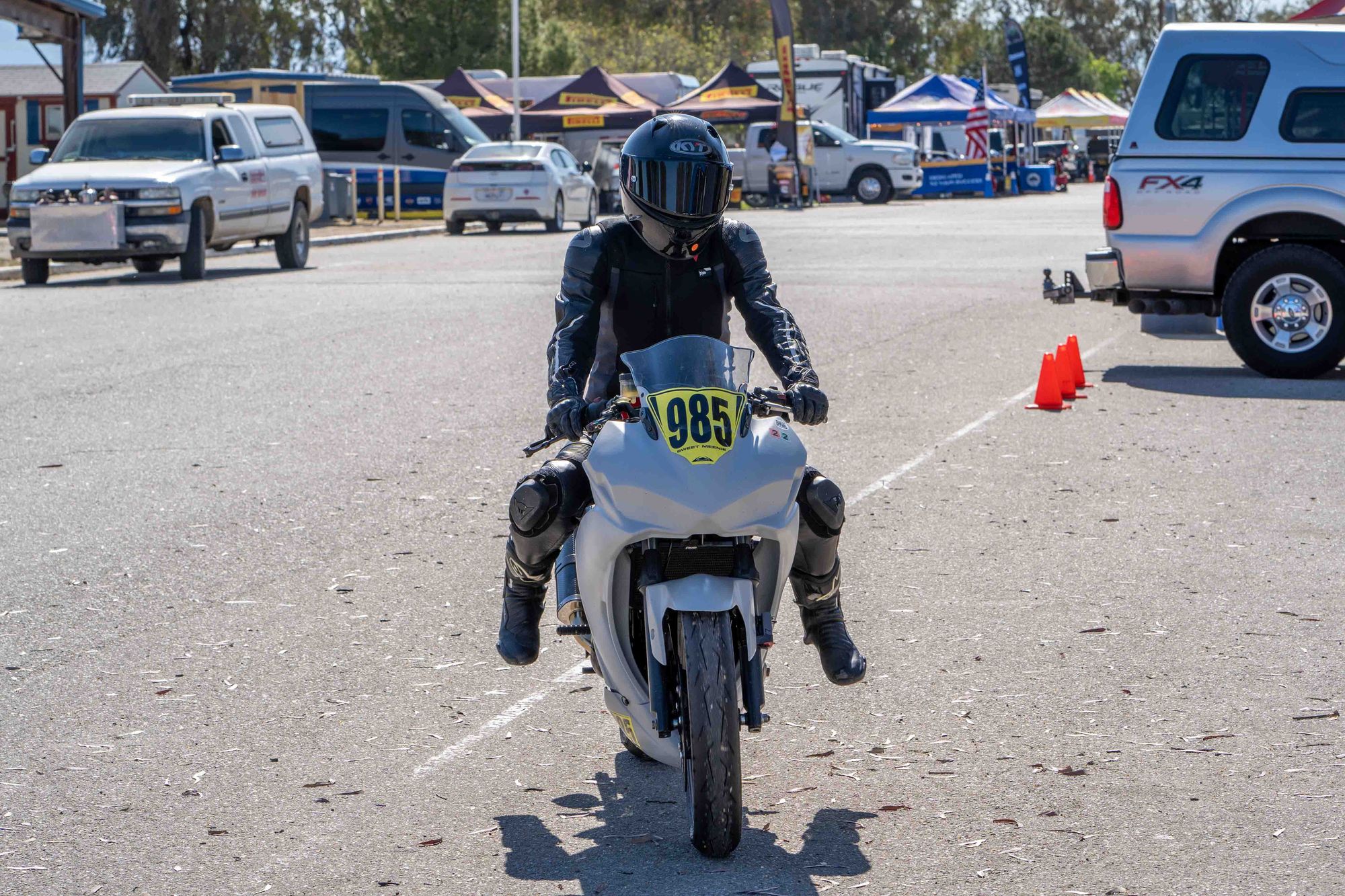
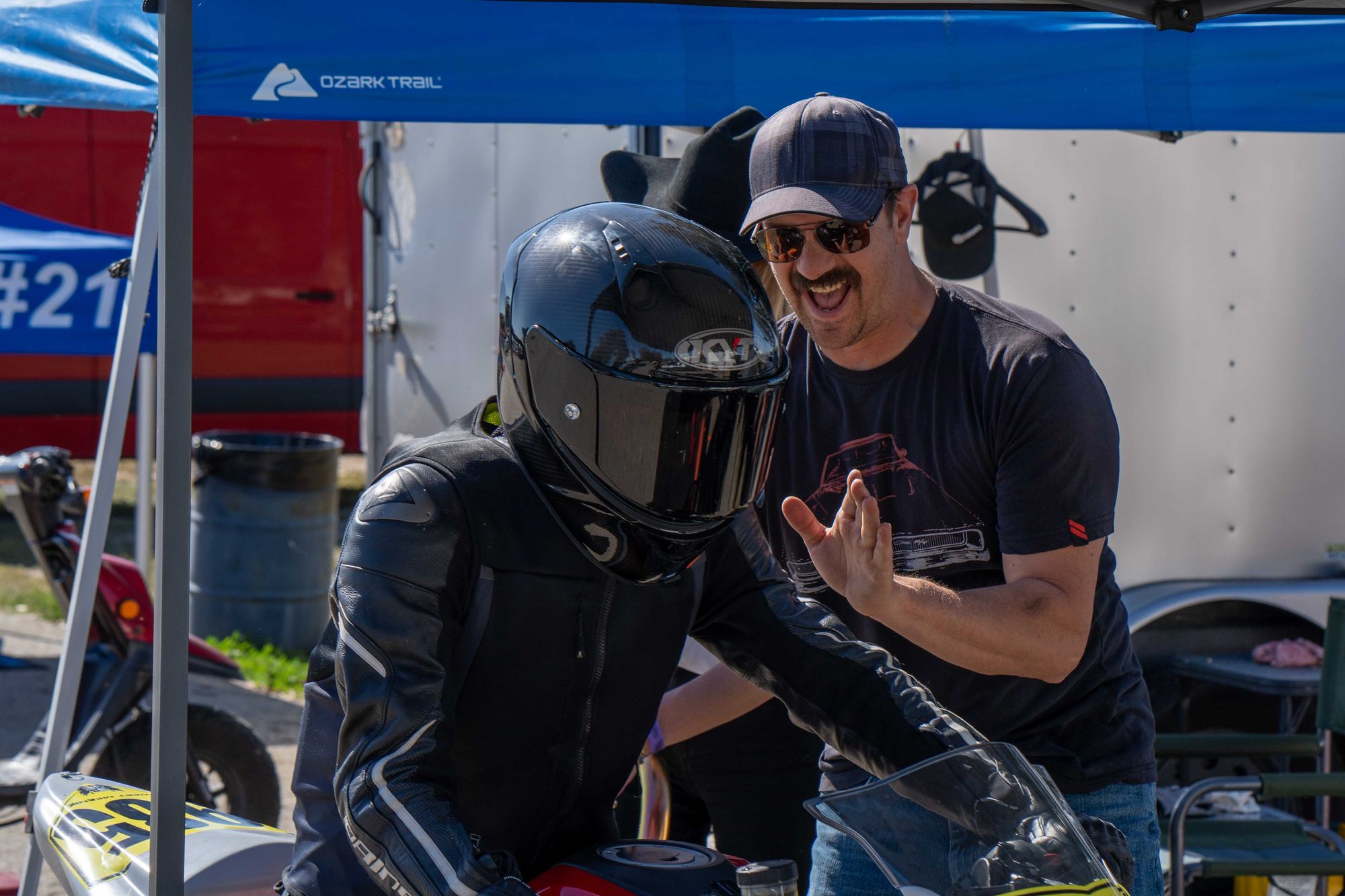
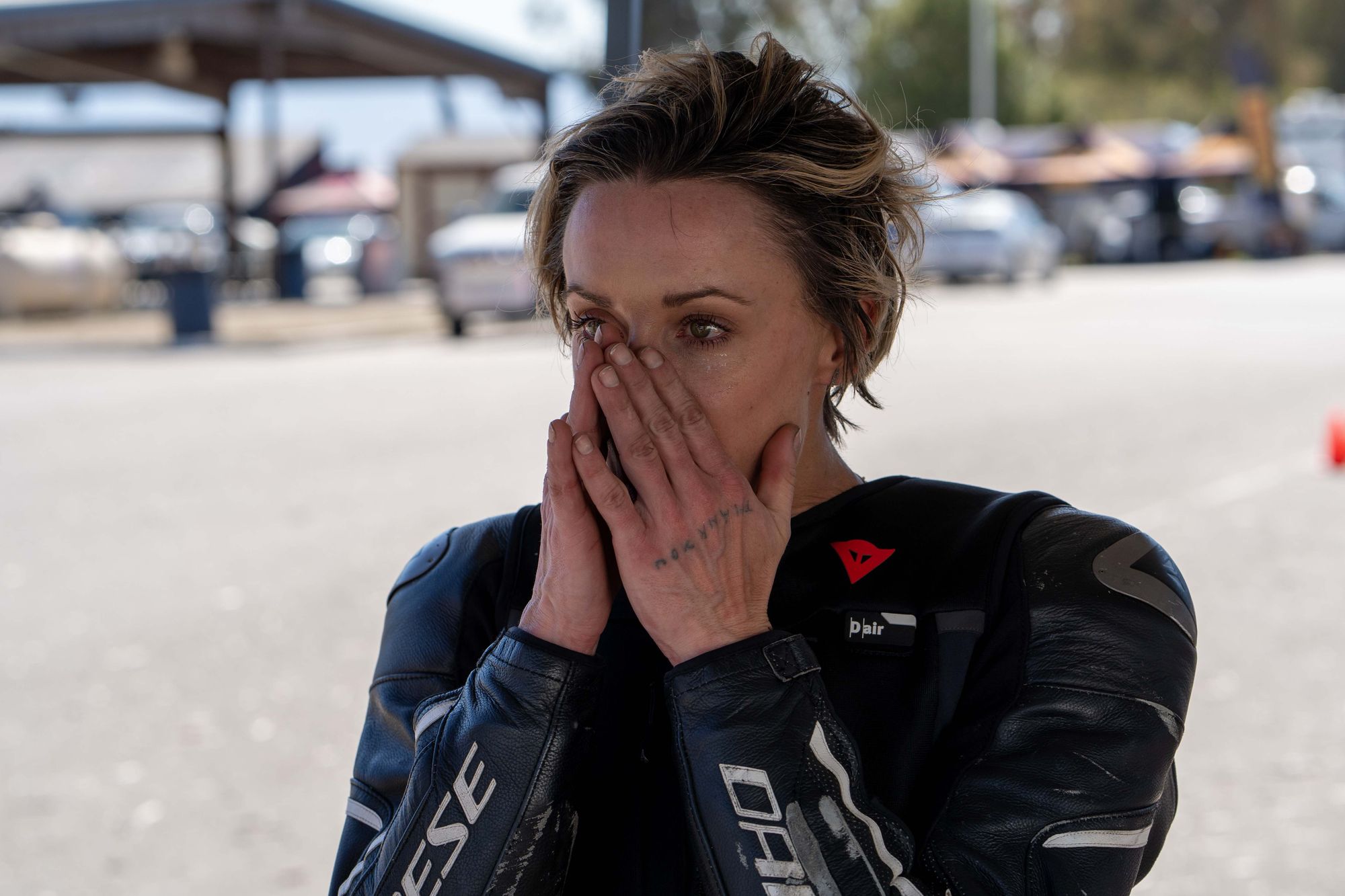
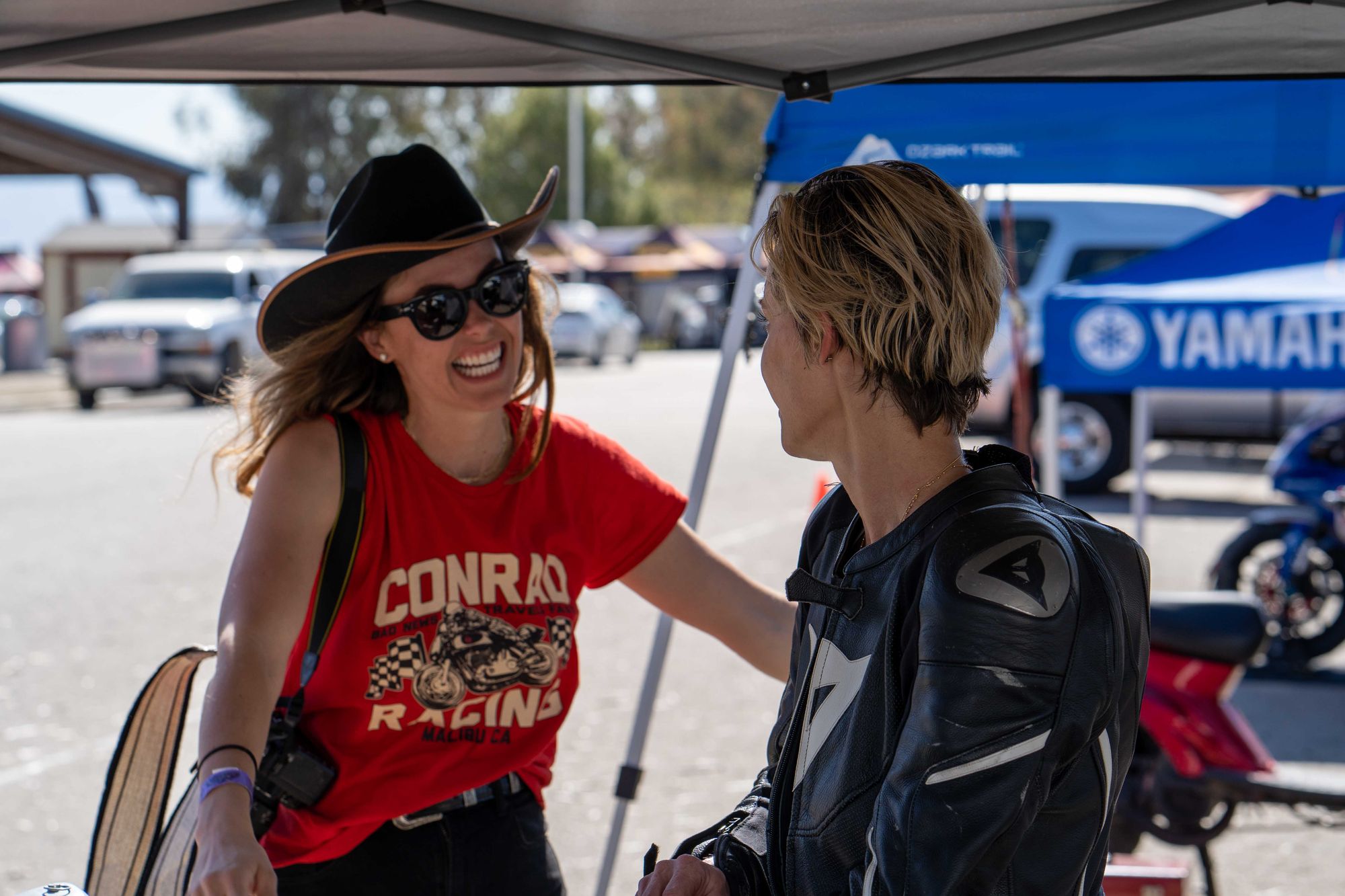
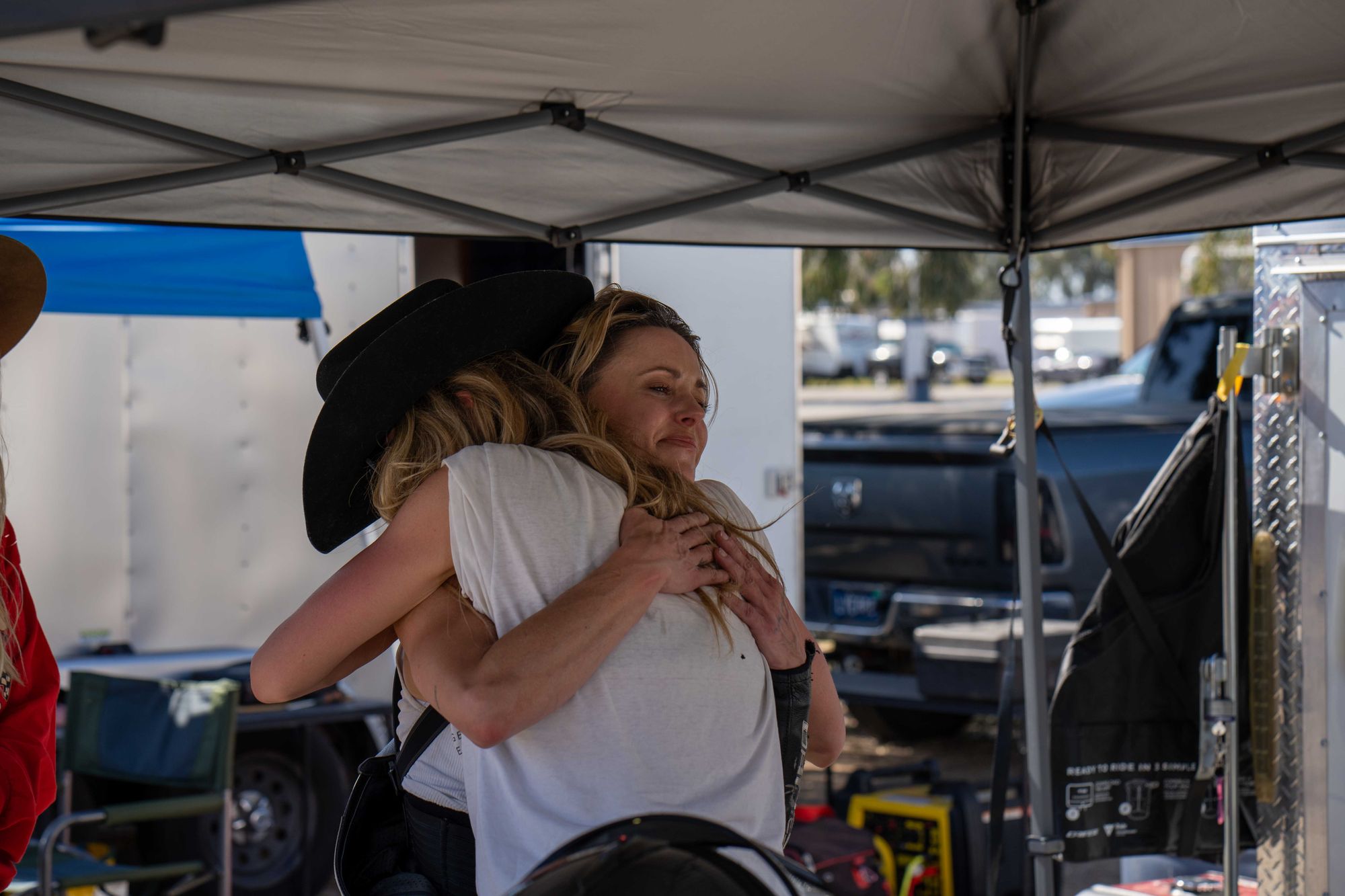
Post-race celebration and happy tears, with (clockwise) Jimi Mac, bestie Kelly and sister Chelsea. [Matthew Fults photos]
She finishes her first race far from the top of the leaderboard, but that wasn’t the goal. The significance of finishing a race where the top speeds exceeded 120 mph is lost on no one. As she rolls into her pit, her best friend Kelly is overcome with emotion. They embrace, and the happy tears arrive. Jimi Mac is there too, excited for his friend.
Camille has conquered again.
“My relationship with my motorcycle is kind of analogous to the relationship that I've developed with myself, and it's kind of a way that I can celebrate not having healed because I understand that that's a lifetime journey, but it's a way for me to celebrate kind of how far I've come.”
Update, Sept. 28, 2023: In the final race weekend of the AFM series, Camille podiumed three times – all second-place finishes – at Thunderhill Raceway Park. In two of those, she was racing women. In the other, it was men.
Check out Camille's story in our 2023 television show.